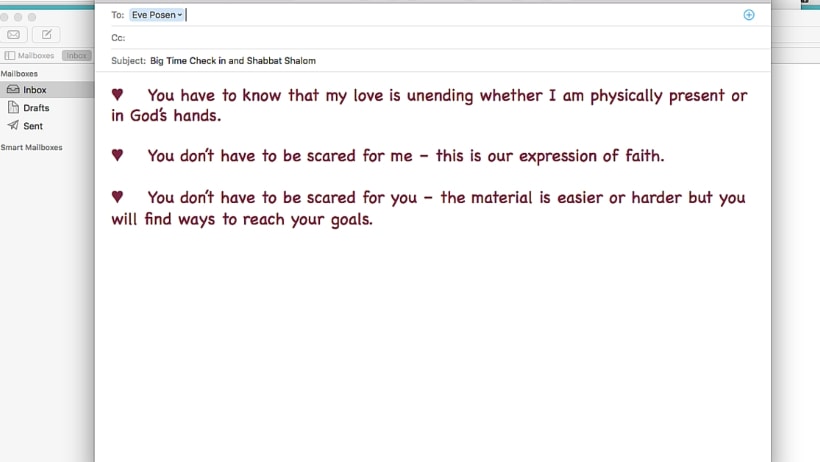As my dad wrote to me after I began my first year of rabbinical school:
“You have to know that my love is unending whether I am physically present or in God’s hands. You don’t have to be scared for me – this is our expression of faith. You don’t have to be scared for you – the material is easier or harder but you will find ways to reach your goals. Let us all learn to spend our time and our conversations expressing our love, respect, admiration and remember that we are indeed betzelem Elohim, created in God’s image. I will always be in your “inbox” and if the words are the same or similar it is because we always try to reduce all we know and feel into these funny bullets (hearts). The down side – it isn’t just a 45 minute ride to give you a hug.”

This was an email in which my dad laid out what he hoped would be his legacy to me: a willingness to face fears and a determination to reach goals. He wanted me to know that who I am is largely because of where I came from and because I learned and grew in a house with values that shaped me.
Our parshah this week, parshat Chukat, is full of plot twists and new experiences for the Israelites. The lands of Sichon and Og are conquered, both Miriam and Aaron die, and we learn that Moshe will not be allowed to enter into the land of Israel. When Miriam dies, we are given one more water miracle on her behalf, with water flowing from the rock. We also learn that the reason Moshe and Aaron are not allowed to enter the land of Israel is because of the incident in which they struck the rock out of frustration instead of speaking to it as God had commanded. The text concludes with praise and thanks sung to God for the water of the well.
As Aaron dies, the text in chapter 20, verse 24 reads, “Let Aaron be gathered to his kin: he is not to enter the land that I have assigned the Israelite people, because he disobeyed my command about the waters of Meribah.” What does it mean that Aaron was “gathered to his kin”? Perhaps it’s suggesting that Aaron’s good qualities “enter” and be gathered into the souls of the living who knew him. Perhaps gathering to his people means being brought in so as they are forever a part of the lives of those who continue to love him and remember him after he is gone.
Like my father’s email to me, the Torah teaches us that the inherited qualities and shared love that came from those before us are always a piece of us. When we lose a loved one, we lose their physical presence, but not the unending guidance and love in our lives. Our job, like the Israelites with Aaron, is to carry on those lessons.
-Rabbi Eve Posen
Source: Heart and Soul – Parshat Chukat 5776 – Rabbi Eve Posen



